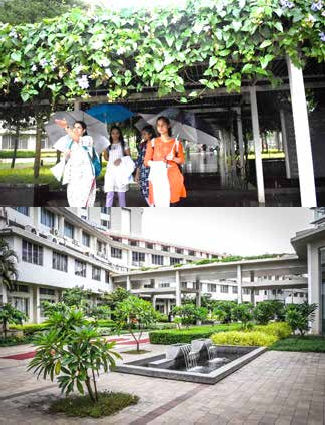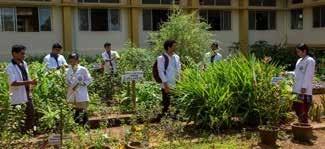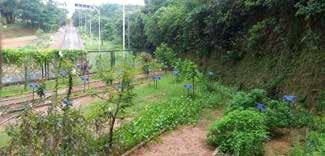
SUSTAINABLE CITIES AND COMMUNITIES
In India, NITI Aayog monitors the implementation and progress of the UN SDG program. The targets under the SDG framework are not meant to be achieved by Government action alone. It requires commitment and concrete action by the private sector. Universities are neutral bodies with a reputation in the society that can contribute to fulfilling the goals by educating the public and other sectors on the SDG.
GREEN CAMPUS
Nitte DU from its inception, has always been conscious of creating eco-friendly campuses and has taken several steps in this direction. The Vision and Mission of the University align with the sustainable development goals.Nitte DU campus has mid-rise buildings, having paved streets with rainwater drainage, adequate and appropriate open spaces in the atrium of every prominent building, shared community spaces for educational, social and recreation purposes, ample drinking water and washroom facilities, proper utilization of vacant land on campus, safe paths for pedestrians and cyclist, partnership with security agencies, waste disposal services, banking, axillary shops, energy providers, cafeteria services and frequent connectivity transport between different sites on campus makes it sustainable for teaching learning community as well as for patients visiting the hospital on Nitte DU campus.

he campus of the University is located 14 kms from the City Centre in the rural limits of Kotekar and Ambalamogaru Village Panchayats. The campus has a well-designed garden with several flowering trees, water fountains and lawns. Its rural location, away from the hustle and bustle of urban traffic. A serene, quaint temple at the entrance that maintains a rose garden adds cheer and colour to the hospital campus welcomes visitors on campus. The walkways are covered by a canopy trellis of clock vines (Thunbergia grandiflora) bearing deep purple inflorescence that provide shade and serenity to visitors. The pathways are also provided with stone benches for resting under the floral

view of the water fountain. All future developments of the campus sites will be at the cutting edge of ecological design to provide an educational experience in sustainability through the design and operation of the facilities. Nitte DU is proactively involved in water conservation mission. It has adopted environmentally friendly methods for water conservation and optimum utilization of water. Recycled water is used for maintaining the lush green landscape all-round the year. Rainwater harvesting is adopted in all three Campuses of the University. Utilisation of open wells and water bodies for rainwater harvesting is practiced. Open wells are the preferred source of water in place of borewells. Its policies and strategies are focused on protection, conservation and sustainable use of its precious freshwater resources.
REDUCE, REUSE WATER:
Nitte (DU) adapts water efficient appliances in its campus. Traditional taps are being replaced by Self-limited push-cock based taps and sensor-based taps to reduce water wastage. In Nitte campus, the most water consuming places are hospitals and hostels. Energy efficient shower heads are installed in these areas which consume less water per minute due to reduced flow mechanisms.
COMMON PRACTICES FOLLOWED IN NITTE (DU):
- Water Efficient Shower Head (rated from 1.5- 2.0 gallons per minute)
- Replacement policy for leaking taps
- Installing displacements devices inside toilet cisterns
- Push cock taps are being used as replacement for ordinary taps to reduce water wastage
- Use of adjustable sprinklers in the garden
- Installation of drip irrigation system in the college campus
BUILDING SUSTAINABLE CITIES AND COMMUNITIES VIA CURRICULUM:
The University also has active research projects on water and wetland conservation. Nitte institute of architecture has undertaken a diverse body of works exploring the idea of Water Conservation, Water and the Human settlements at NIA which I have been a part of, are as follows:
STUDENT RESEARCH:
- Landscape Design (8th) Sem: Final design projects exploring water and ecological systems
- Social Housing Studio (4th and 8th) Sem: Vertical Design Studio: Fishing Community Housing and Migrants Housing along ecological systems
- Water Exploration Studio (7th) Sem: Urban Studio: On-going work: Exploration on still water, flowing water and expansive water
FACULTY RESEARCH:
- Nagar Nadi Research Fellowship by Asst. Prof. Nikhil Shah in collaboration with People’s Resource Centre (PRC), Delhi, IN: The research aims to explore the City- River relationship with respect to various developments on the riverbanks and their impact on the sustainability of the city and the region of Surat, Gujarat, IN.
- Also, the sensitization and training about water conservation are undertaken to encourage students and staff to save water within the campus.
IMPROVING INDOOR AIR QUALITY:
The A.B.Shetty Memorial Institute of Dental Sciences is in the University Campus. Although this campus has the least green cover as compared to Paneer or Medical College campus, they have a good practice that targets the improvement of indoor air quality. Every common room has indoor plants which are well tended and provide’s healthy oxygen rich air and reduces the carbon-di-oxide released by the human occupants. The Institute has always supported the concept of Clean City Green City in college by various initiatives.

CONSERVING BIODIVERSITY ON CAMPUS:
The KSHEMA campus as well as Paneer campus have medicinal gardens. A total of 125 medicinal plants are planted and cataloged for its scientific name, common name, medicinal uses and their major chemical components reported. Paneer campus has medicinal gardens at Nitte Usha Institute of Nursing Sciences and Nitte Gulabi Shetty Memorial Institute of Pharmaceutical Sciences. Nursing institute maintains about 61 medicinal plants. While the Pharmacy Institute maintains about 55 species of medicinal herbs and shrubs.
PARTNERING WITH MHRD FOR RURAL DEVELOPMENT:
itte DU has partnered with the Ministry for Human Resource Development (MHRD), Government of India, for the Unnat Bharat Abhiyan program. It is a flagship program of the Ministry for Human Resource Development (MHRD), Government of India, which aims to bring about transformational change in rural development processes by leveraging expertise of Knowledge Institutions. Its mission is to link the Higher Education Institutions with a set of villages, so that these institutions can contribute to the economic and social betterment of these village communities using their knowledge base. The Nitte (DU) has adopted 5 villages in Dakshina Kannada and Udupi districts under the ‘Unnat Bharat Abhiyaan’ namely, Neere, Belma, Sasihithlu, Manjanady and Arkula. The needs of the communities in these villages are being assessed to prioritize local development plans. The University offers its expertise and resources to help achieve these needs by liasoning with Government and non-governmental agencies.
HOUSING AID
- 28 houses constructed in Boplapur Village, Rona Taluk, Gadag District for flood-affected families
- 75 families in Nitte village provided with financial assistance to construct houses
- Six public wells were constructed and maintained in Nitte village
- Construction of building for Nitte Panchayath office and meeting hall
- Construction of a community hall of 800 capacity at the cost of Rs. 1.5 crores at Sri Durga Parameshwari Temple, Nitte



.png)